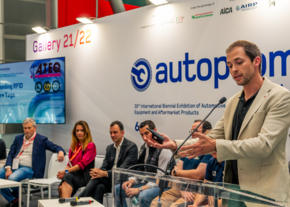
26/11/2018
Smart Cities, digital solutions for new urban mobility
Simonluca Pini – Il Sole 24 Ore Contributor Editor
Internet of things, artificial intelligence and 5g networks will turn urban mobility upside-down.
Connected, safe and efficient. Starting with these three characteristics, “ordinary” urban centres will gradually turn into Smart Cities, capable of communicating with surrounding structures improving, at the same time, the living conditions of all its inhabitants. Although this transformation will shape a long list of sectors and services, from waste management to the intelligent use of renewable energy, the greatest changes will take place in the field of mobility. Self-driving cars, totally autonomous vehicles no longer requiring to be physically driven, are the talk of the town. Meanwhile, huge investments are being made with a view to reducing road accident victims down to zero.
All this will be possible only in a setting where all vehicles and infrastructures will be able to freely communicate with each other, and given the desolate conditions in which several Italian cities lie, to many this may seem nothing short of science fiction, however Smart Cities are already a reality, and this thanks to smart networks and infrastructures starting with Milan at the top of the Smart City list. The real driving force, though, will come with the introduction, from 2019, of 5G connectivity, capable of ensuring lightning data exchange - from the current gigabit to 10 Gbps and beyond - with little, if any, time delay. What does it mean? In a connected environment, a car will be able to alert another vehicle about its position within a millisecond, against the 20/30 ms needed by the most advanced systems on the market today, thus avoiding an accident. As things stand, several vehicles are equipped with Car to X protocol, able to "speak" autonomously with other cars, for example, to signal a dangerous situation. This "new age" of connectivity will open unprecedented scenarios, starting from the vital role played by the Internet of Things set to merge with the Internet of Cars ensuring a "common thread" between domestic life, work and mobility. All combined in a city able to understand in real time the needs of its citizens. Smart cities will significantly enhance the quality of life, starting with everyday problems such as looking for parking. In fact, thanks to the massive presence of cameras and sensors throughout the city, autonomous vehicles will be informed about the nearest available free space, turning one of the most dreaded actions into a stress free experience for the driver besides reducing the quantity of emissions produced.
The real turning point, though, will come through a change in the general perception of transport. Mobility is slowly turning into a service, best expressed by the acronym Maas (Mobility as a Service). The key concept is to put both passengers and freight right in the picture offering tailor-made mobility solutions based on the individual needs of the end-users. If, on the one hand, several shared mobility schemes, such as bike sharing or car sharing services, are already able to move people, in the future an integrated platform will combine private and public vehicles. According to a PwC study, the market for on-demand car sharing services is expected to grow from $ 87 billion in 2017 to $ 1.4 trillion in 2030. In Europe alone, estimates speak of a growth that is expected to go from $ 25 billion in 2017 to over 450 billion dollars in 2030. The fact that data sharing will be the true protagonist of tomorrow’s mobility scenario, was confirmed by the Chinese government decision to restrict, from 2025, new registrations only to vehicles able to share information among themselves and the surrounding environment. If China takes the lead, then connected cars will become a constant feature also in Europe, in a scenario where Smart Cities will replace traditional urban centres.
All this will be possible only in a setting where all vehicles and infrastructures will be able to freely communicate with each other, and given the desolate conditions in which several Italian cities lie, to many this may seem nothing short of science fiction, however Smart Cities are already a reality, and this thanks to smart networks and infrastructures starting with Milan at the top of the Smart City list. The real driving force, though, will come with the introduction, from 2019, of 5G connectivity, capable of ensuring lightning data exchange - from the current gigabit to 10 Gbps and beyond - with little, if any, time delay. What does it mean? In a connected environment, a car will be able to alert another vehicle about its position within a millisecond, against the 20/30 ms needed by the most advanced systems on the market today, thus avoiding an accident. As things stand, several vehicles are equipped with Car to X protocol, able to "speak" autonomously with other cars, for example, to signal a dangerous situation. This "new age" of connectivity will open unprecedented scenarios, starting from the vital role played by the Internet of Things set to merge with the Internet of Cars ensuring a "common thread" between domestic life, work and mobility. All combined in a city able to understand in real time the needs of its citizens. Smart cities will significantly enhance the quality of life, starting with everyday problems such as looking for parking. In fact, thanks to the massive presence of cameras and sensors throughout the city, autonomous vehicles will be informed about the nearest available free space, turning one of the most dreaded actions into a stress free experience for the driver besides reducing the quantity of emissions produced.
The real turning point, though, will come through a change in the general perception of transport. Mobility is slowly turning into a service, best expressed by the acronym Maas (Mobility as a Service). The key concept is to put both passengers and freight right in the picture offering tailor-made mobility solutions based on the individual needs of the end-users. If, on the one hand, several shared mobility schemes, such as bike sharing or car sharing services, are already able to move people, in the future an integrated platform will combine private and public vehicles. According to a PwC study, the market for on-demand car sharing services is expected to grow from $ 87 billion in 2017 to $ 1.4 trillion in 2030. In Europe alone, estimates speak of a growth that is expected to go from $ 25 billion in 2017 to over 450 billion dollars in 2030. The fact that data sharing will be the true protagonist of tomorrow’s mobility scenario, was confirmed by the Chinese government decision to restrict, from 2025, new registrations only to vehicles able to share information among themselves and the surrounding environment. If China takes the lead, then connected cars will become a constant feature also in Europe, in a scenario where Smart Cities will replace traditional urban centres.








